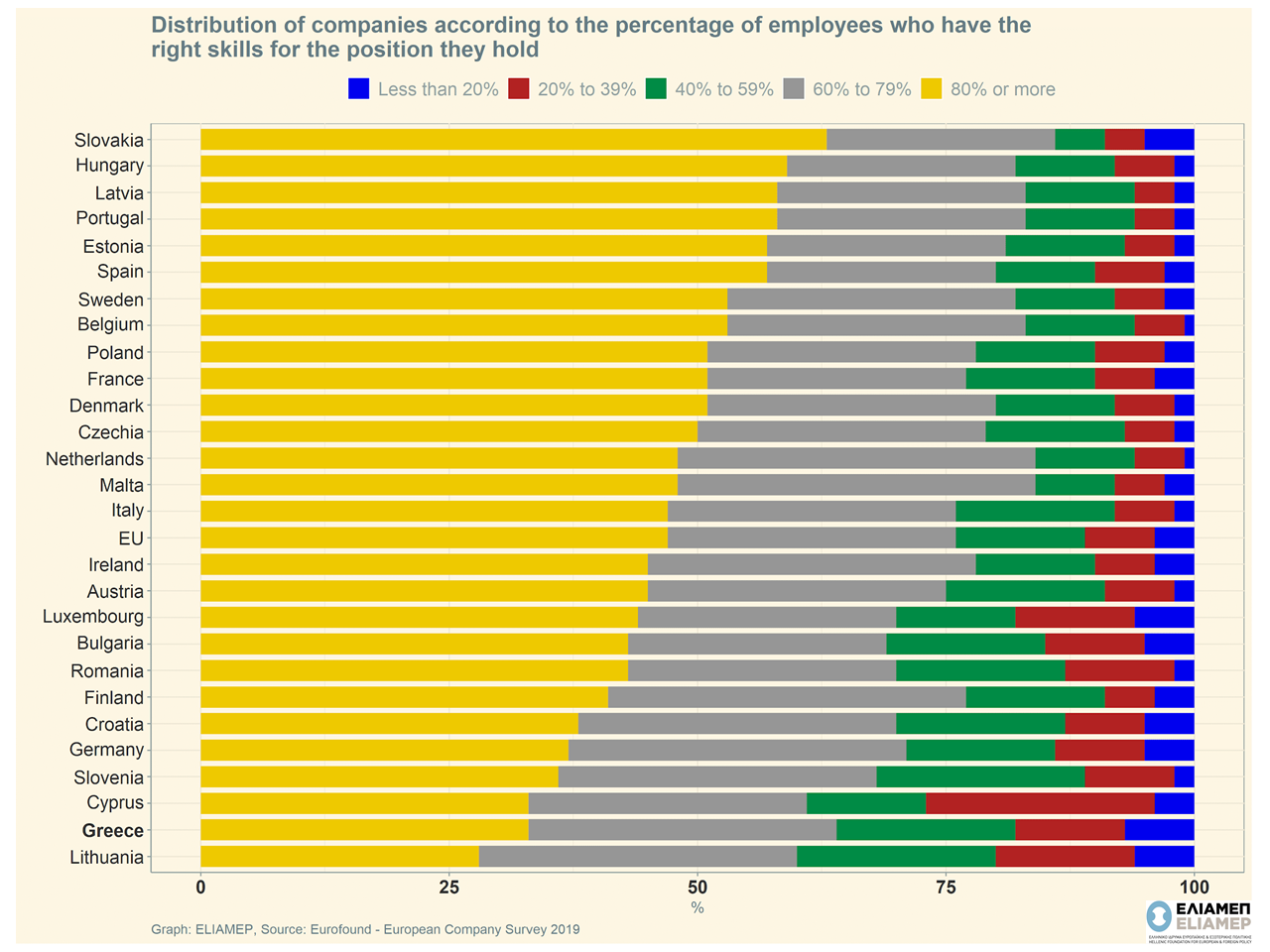The pandemic of multiple lockdowns and the suspension of productive activity (temporary for most companies, but also permanent for some) has radically changed the work landscape. Many employees had to resort to part-time and / or temporary leave, move to different industries, even emigrate, or work digitally in companies based abroad, in search of better career opportunities. This trend is already reflected in the inability of industries (eg tourism) to fill vacancies, while before the pandemic this was not an issue. However, not all current labor market deficiencies can be attributed to the deep but transient pandemic crisis: even before coronavirus, our country was facing chronic structural problems in employment.
An efficient labour market has the ability to match employees’ skills with available jobs. When this process is carried out effectively, without friction, there is a mutual benefit: employees are employed in positions corresponding to their qualifications and companies meet their needs with the appropriate staff. Matching frictions, on the other hand, cause significant costs, which burden both employees and businesses, reducing the performance of both.
The Greek labor market has historically suffered in this area. According to recent Eurofound survey data , based on questionnaires distributed to companies and collected in 2019, the percentage of employees who have the appropriate skills for the position in which they work was very low in Greece. In particular, only 33% of the companies that participated in the survey answered that the vast majority of their employees (over 80%) have the right skills for the position they hold. In contrast, 36% of companies stated that the percentage of their employees who are in the right position based on their skills is below 60% (see graph). The data show that in terms of matching skills Greece is significantly behind the European average (47% of companies stated that more than 80% of their employees have the right skills for the position, while only 24% of companies stated that a percentage lower than 60% of employees have the necessary skills). This creates a paradox: given the persistently high unemployment rate in Greece, companies should in principle have more leeway in choosing the right candidate.
The findings of the CEDEFOP European Skills Index confirm the aforementioned findings. According to the results for 2022, in the field of matching skills, our country is ranked 30th among 31 countries. Also, data from the latest OECD Adult Skills Survey (PIAAC) show that the percentage of people aged 15 to 64 with “global skills” in Greece (9.3%) is the lowest among all countries surveyed except Turkey and Chile.
The reasons for this negative performance should be sought in the so-called “skills production system”, as well as in its interaction with the labor market. First of all, although higher education has expanded dramatically in recent years, the skills of graduates have not improved accordingly. Specifically, the percentage of Greeks aged 25 to 34 with a degree almost doubled between 2000 and 2020 (from 23.3% to 43.7%), and has now exceeded the EU average (40.5% in 2020). However, data from the PIAAC survey for 2015 show that 18.7% of graduates lacked basic literacy, numeracy, and problem-solving skills. Greece’s rate was the highest among all countries surveyed, and double that of the country with the second worst performance (Lithuania, 9.3%).
On the other hand, the quality of vocational education and training is low. The issue is huge, and concerns both initial vocational education and training (provided mainly by the state) and continuing education (funded mainly by the NSRF and other EU programs). Companies are also responsible for the low participation in the training. In Greece only 18.5% of employees attended a training program organized by their employer, while the corresponding percentage in the EU is 42.9%. The Greek growth model mostly consists of small businesses, which do not invest in training programs for their employees. However, even the largest Greek companies offer training to a lesser extent than their European counterparts. As mentioned in a previous In focus, business indifference towards training impedes the upgrading of the growth model.
The advent of the pandemic undoubtedly exacerbated the problem. However, the Recovery and Resilience Fund offers a window of opportunity, so that with well-designed active labour policies, the performance of the Greek labor market in matching skills to jobs can be significantly improved. The National Recovery and Resilience Plan is devoting € 2.4 billion to reforms related to education, technical training and skills development. In summary, the plan places great emphasis on supporting the private sector in order to provide the necessary programs for the acquisition and upgrading of employees’ skills, while also providing for the improvement of the services provided by OAED. Indicative of the project’s targeting is the reform of employee training, which is expected to be implemented horizontally across the entire workforce, with an emphasis on digital skills.
Although European grants and loans have solved the funding problem, the availability of resources is not enough. Resources should be directed towards actions that upgrade the skills production system, and advance the level of skills of employees and the unemployed in Greece. So far the discussion has focused mostly on the bad record of Greece in absorbing EU funds. The issue, however, is not spending at all costs, but the implementation of well-designed training programs that meet the needs of the market, by entities that are certified for the quality of the training services, and which are ex-post controlled based upon the performance of trainees in the labor market.




